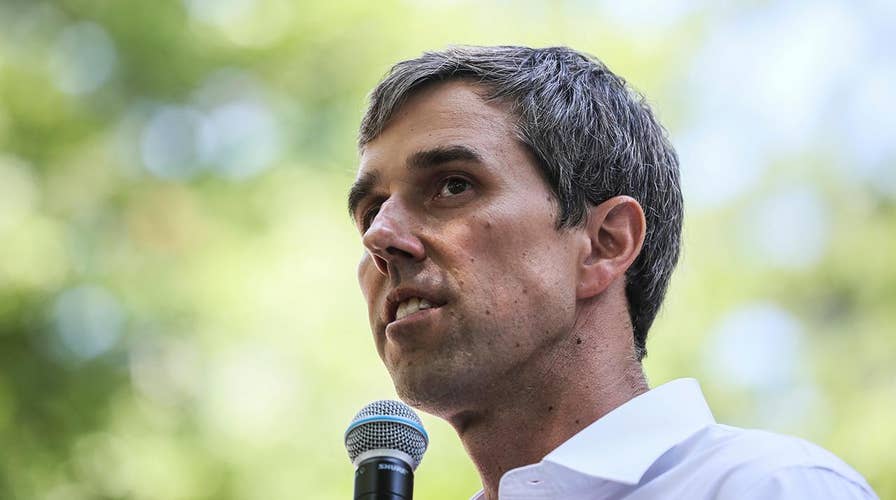Beto O'Rourke claims he and his wife descend from slave owners
Is this a good move for O'Rourke politically? Reaction from Fox News contributor Karl Rove and Mo Elleithee from the Georgetown Institute of Politics.
Marianne Williamson and Beto O'Rourke wholeheartedly embraced reparations for black Americans during Tuesday night's Democratic primary debate -- a national wedge issue that, at least in the debate hall in Detroit, Michigan, seemed more like a surefire applause line.
O'Rourke announced that, as president, he would work to sign Texas Rep. Sheila Jackson Lee's reparations bill. That legislation, according to Jackson Lee's office, would "examine the institution of slavery in the colonies and the United States from 1619 to the present, and further recommend appropriate remedies."
But Williamson, to cheers, suggested the time for analysis is over -- and calculated that the “forty acres and a mule” that black Americans were promised after the Civil War has come due, plus interest and accounting for inflation.
“Well, first of all, it’s not $500 billion in financial assistance, it’s $200 to $500 billion payment of a debt that is owed," she began. "That is what reparations is. We need deep truth-telling when it comes, we don’t need another commission to look at evidence. I appreciate what Congressman O’Rourke has said. It is time for us to simply realize that this country will not heal."
Williamson continued: "All that a country is, is a collection of people. People heal when there’s some deep truth-telling. We need to recognize, when it comes to the economic gap between blacks and whites in America, it does come from a great injustice that has never been dealt with. That great injustice has had to do with the fact that there was 250 years of slavery followed by another hundred years of domestic terrorism.”
Asked how she came up with her numbers, Williamson responded, “If you did the math of 40 acres and a mule, given there was four to five million slaves at the end of the Civil War, and there were probably 40 acres and a mule for every family of four, if you did the math today, it would be trillions of dollars. And I believe that anything less than $100 billion is an insult, and $200 to $500 billion is politically feasible today because so many Americans realize there is an injustice that continues to form a toxicity underneath the surface, an emotional turbulence that only reparations will heal.”
Her remarks echoed her previous comments on the matter: “What I have proposed is $200 to $500 billion — I think anything less than $100 billion is an insult," Williamson told The Hill in April.
In a separate moment destined for memehood, Williamson called out the "dark psychic force" that she implied contributes to racism.
"The racism, the bigotry and the entire conversation that we’re having here tonight, if you think any of this wonkiness is going to deal with this dark psychic force of the collectivized hatred that this president is bringing up in this country, then I’m afraid that the Democrats are going to see some very dark days," Williamson said.
She continued: “We need to say it like it is — it’s bigger than Flint. It’s all over this country. It’s particularly people of color. It’s particularly people who do not have the money to fight back. And if the Democrats don’t start saying it, why would those people feel they’re there for us. And if those people don’t feel it, they won’t vote for us, and Donald Trump will win.”
Asked by a CNN reporter after the debate how she thought it went, Williamson laughed, "I’ll tell you later when I see the memes."
But polling suggests that Williamson would need to change the minds of a significant number of Americans for her reparations plan to become reality.
A Fox News poll in April found that 60 percent of Americans oppose paying cash reparations to descendants of slaves, while just 32 percent support it. A Rasmussen poll in the same month found that just 21 percent of likely voters think taxpayers should pay reparations to black Americans who can prove they are descended from slaves.
However, in a finding that could put 2020 Democratic presidential hopefuls in a bind, the Fox poll found that among Democratic primary voters, 54 percent said they were likely to support a candidate who backed reparations, while 33 percent said they were not likely.
Additionally, Data For Progress found in a poll last year that while the measure had only 26 percent of Americans in favor, it had net positive support among voters under 45. A Point-Taken Marist poll in 2016 found that while 68 percent of Americans were opposed to reparations, 6 in 10 black Americans said they were in favor.
A number of 2020 presidential candidates have dabbled in talk of reparations, although several have yet to really dive into the controversial waters -- remaining vague about the extent of their plans.
OCASIO-CORTEZ CALLS FOR 'AGENDA OF REPARATIONS' AS 2020 DEMS GET ON BOARD
Sen. Kamala Harris, D-Calif., suggested to The Grio in February that it could include a generic tax credit to families making under $100,000 -- a much less controversial proposal. Sen. Elizabeth Warren, D-Mass., has gone a step further and said that Native Americans should be “part of the conversation.”
Sen. Cory Booker, D-N.J. has introduced a Senate version of Lee’s bill to study the question. In his prepared testimony, he says the U.S. has yet to "truly acknowledge and grapple with the racism and white supremacy that tainted this country's founding and continues to cause persistent and deep racial disparities and inequality."
Fox News' Adam Shaw contributed to this report.





